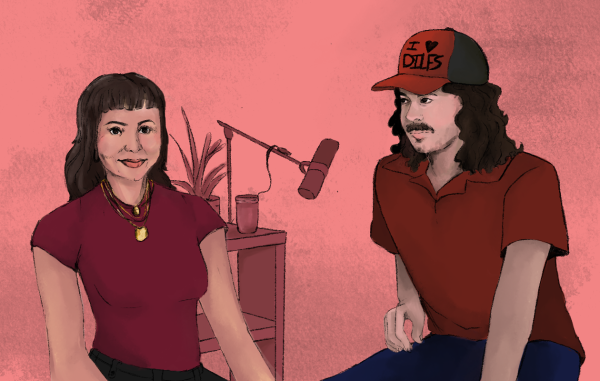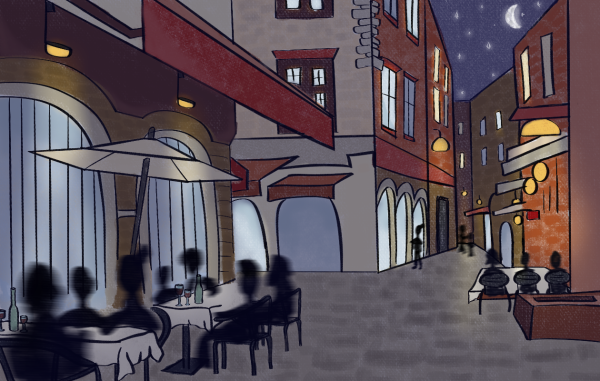the dominance of the male gaze in pop culture: a study of matthew gray gubler
At the beginning of the semester I started watching “Criminal Minds” on Netflix. Obviously it’s not by any means a new show and my friends have been talking about it since I was in middle school, but naturally being a bit of a chicken, I just now have been able to stomach some of the creepy stuff that they talk about.
One of the things that I distinctly remember hearing my friends talk about in regards to the show was how much they loved Spencer Reid, aka Matthew Gray Gubler, and I didn’t fully get it at the time, but boy do I see what they’re saying now. I couldn’t help but laugh that Reid is the guy everyone is crushing on (he has full Etsy shops dedicated to him to prove it) when he’s standing next to Derek Morgan, aka Shemar Moore, who, as Penelope often points out on the show, is undeniably gorgeous.
When I mentioned how much women love Matthew Gray Gubler to a guy friend, he was literally floored. Why would women like Reid who’s lanky and a little socially awkward more than Derek who’s buff and suave? But the Matthew Gray Gubler vs. Shemar Moore effect is the perfect example of the male vs. the female gaze. The male gaze is so prevalent in our society that it even has us questioning why we find someone attractive and makes us feel like we made the wrong choice, as if there even is a “wrong choice.”
This is just as harmful for men as it is for women. Just like how not every woman is genetically built to be a size two, not every guy is built to be over six feet tall and be able to bench press their own weight. We are so conditioned to expect to see the male gaze in movies and TV, we’re all slightly taken aback when that’s not the perspective we’re seeing. Why should we expect to see more media from someone like Michael Bay’s perspective than Greta Gerwig’s?
Since I am in no way an expert on misogyny in pop culture or gender communication, I decided to direct my questions toward someone who is, Dr. Cristin Compton.
Compton is a professor in the School of Communication Studies at Kent State University and is considered an expert in the field of gender and communication.
Compton explained the concept of the male gaze it to me like this: “The concept of the male’s gaze is a critique about filmmaking; it’s from the point of view of a heterosexual cisgender — usually white — male-identifying person and because of the discourse surrounding femininity often in America, and western society in general, we portray the woman as a sex object without having a lot of backstory and dialouge.”
When I asked why we are so used to seeing and accepting the male gaze, Compton shared that it’s all about power and that there’s no singular person at fault, but it’s important that we discuss the complexities around it.
To put it simply, Compton brought up a well-known feminist quote that says “you can’t be what you can’t see,” which shows how harmful it can be for women and other disenfranchised groups like people of color or the LGBTQIA+ community to not see people who represent themselves in certain positions of power. She said, “If you have to carve a brand new path and explain and justify yourself at every step of the way, then you don’t even truly know what it looks like when you get there, when you achieve success…you can do the work to meet what those expectations are and still feel pretty unfulfilled.” All this can be a result of not seeing yourself represented.
In regard to how seeing more media through the female gaze could benefit our society, she remarked that it can help us recognize and discuss differences, saying, “For young people, seeing male-presenting, female-presenting and everyone else having different body types, skin colors, ethnic backgrounds, religions, political beliefs and sexual identities become meaningful because it shows that there are many different ways to be.”
This is obviously an incredibly complex topic that we still don’t have all the answers to, but what I really wanted to know is how can we increase seeing things from different perspectives other than a purely cisgender male lens, aside from watching Greta Gerwig movies on repeat? Compton’s advice is this: to diversify the perspectives that you see, be purposeful in what you consume and seek media from various points of view. While I plan on seeking out shows with different perspectives, I’ll still check in on Dr. Reid every once in a while.
Support Student Media
Hi, I’m Grace Avery, the Editor In Chief of A Magazine. My staff and I are committed to bringing you the most important and entertaining news from the realms of fashion, beauty and culture. We are full-time students and hard-working journalists. While we get support from the student media fee and earned revenue such as advertising, both of those continue to decline. Your generous gift of any amount will help enhance our student experience as we grow into working professionals. Please go here to donate to A Magazine.












